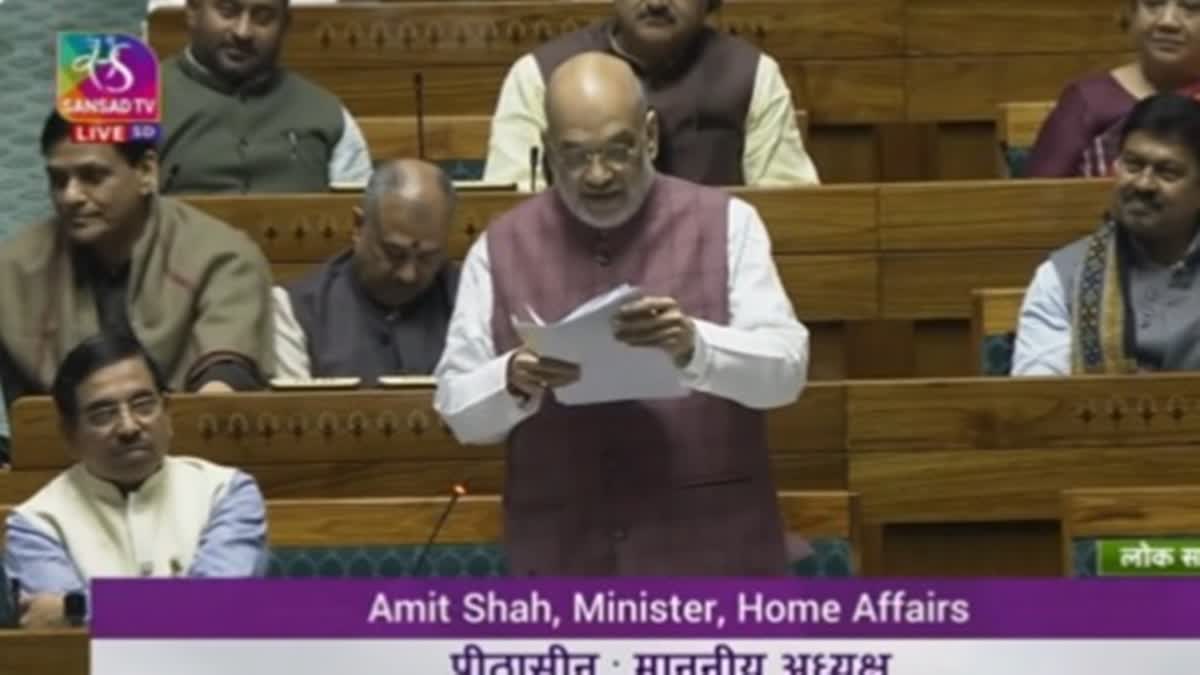Jodhpur: As the Jammu and Kashmir Reorganisation (Amendment) Bill 2023 was passed in the Parliament on Monday, Home Minister Amit Shah praised the first Deputy Prime Minister and Home Minister of Independent India Sardar Vallabhai Patel for merging the princely state of Jodhpur with the country. The Jammu and Kashmir Reorganisation (Amendment) Bill and the J&K Reservation Amendment Bill which were passed in the Parliament are aimed at nominating two members from the Kashmiri migrant community and one representing the displaced persons from Pakistan-occupied Kashmir (PoK) to the J&K legislative assembly and providing reservation to certain communities in Jammu and Kashmir. Participating in the discussion on the bills in the Rajya Sabha, Home Minister Amit Shah accused the country's first Prime Minister Nehru of his “mistakes” he said led to the Kashmir conflict and sufferings of the natives.
He accused Nehru of not doing the work of Kashmir merger well. Shah however praised iron man Sardar Vallabhbhai Patel for his work of merging the princely state of Jodhpur with India. Shah said. “When it came to the merger of princely states in the country, Pandit Nehru had taken the responsibility of merging Kashmir, while Sardar Patel had the responsibility of including Hyderabad, Junagadh, Jodhpur and other princely states. Nehru was not completely successful in his work and left it incomplete, whereas Sardar Patel completed this work very well. He included princely states like Hyderabad and Jodhpur in India”.
Merger of Jodhpur four days before independence: Before the princely state Marwar was merged into Greater Rajasthan in 1949, it was first merged into India. The princely state of Jodhpur joined India on 11 August 1947, four days before independence. The then Maharaja of Jodhpur Hanwant Singh wanted to merge with Pakistan instead of India which left the people of the country, freedom fighters and public representatives shocked.
However, historians of Jodhpur believe that Hanwant Singh was not only a Maharaja but also a politician. His aim was that Jodhpur should get special status in India, for which he had made many demands. He said if the demands were not met by the government of India, he would join Pakistan. While he and his father Umed Singh had decided that they would remain in India, the latter died in June 1947.
Contact with Bhopal, meeting with Mountbatten: After Umed Singh's death, the command of the state was handed over to Hanwant Singh. At the time the princely states of Bikaner and Jaisalmer were in contact with the Nawab of Bhopal. Nawab's advisor Sir Zafarullah Khan met Hanwant Singh and asked him to join Pakistan.
He told Hanwant Singh that Pakistan's founding father Ali Mohammad Jinnah was ready to sign on a blank paper to accept all the demands. Hanwant met Jinnah in Delhi, but on the same day, Sardar Patel's confidant VP Menon also met Maharaja Hanwant Singh at the Imperial Hotel after coming to know that Maharaja Kumar and Hanwant Singh of Jaisalmer had met Jinnah.
According to the book 'Freedom at Midnight' written by journalists Larry Collins and Lapierre, Menon had prepared first Viceroy and Governor General of Independent India Lord Mountbatten to meet Hanwant Singh. Mountbatten talked to Maharaja Hanwant Singh and told him about the relationship between his father and Sardar Patel. On this Maharaj Hanwant Singh agreed to merge with India.
Discussion with Maharaja of Jaisalmer: Hanwant Singh's advisor, Omkar Singh Babra has mentioned in his book 'Ek Maharaja Ki Antar Katha' that Menon was also ready to accept the special conditions of Maharaja Hanwant Singh. On page 80 of Menon's book 'Integration of Indian State', he has written that regarding the demands put forward by Maharaja, Menon had said that what he wanted was impossible.
When the Maharaja told Menon that Jinnah was ready to sign on blank papers for merger with Pakistan, Menon said that he will be deceived. Three days later, on 11 August, Hanwant Singh signed the letter of merger with India in Delhi.
Also read:



